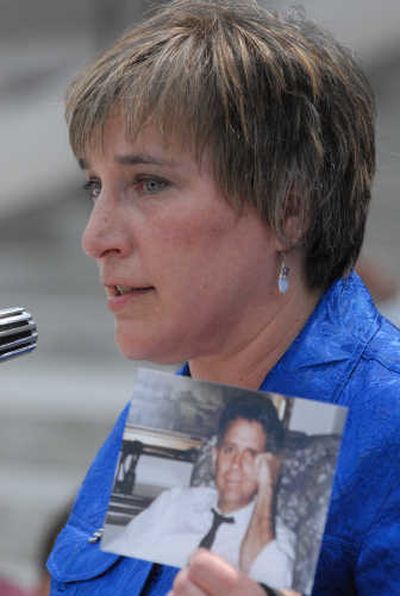Assisted suicide measure likely to go to voters this fall

OLYMPIA – Former Gov. Booth Gardner and a crowd of supporters Wednesday filed nearly 320,000 signatures with state election officials, cementing Washington’s role at the center of the national debate over assisted suicide.
Initiative 1000, which would allow terminally ill people to get a prescription to end their own lives, is now all but certain to go to voters on the November ballot.
The only other state with a similar law is Oregon, where last year 85 terminally ill people applied for prescriptions. Of those, 49 used the lethal drugs. “I think we’re going to go all the way,” said Gardner, who has Parkinson’s disease. “I’ll bet on it.”In fact, he has bet on it: Gardner has personally contributed $120,000 of the $1.3 million the campaign has raised so far, according to campaign finance reports.
Signing the final petition Wednesday was Nancy Niedzielski, a Lynnwood woman who two years ago watched her husband, Randy, die of brain cancer. As death approached, he became incontinent, deaf, unable to control his limbs or close his eyes.
“This is for you, Randy,” Niedzielski said, looking skyward with glistening eyes after she signed her name. “I love you most of all and then some.”
In his final days, she said, her husband asked her to try to change the law to allow for lethal prescriptions in such cases. She personally gathered more than 1,600 signatures for what she and other proponents are calling the “Death with Dignity” measure.
“One step forward,” Niedzielski said, standing before dozens of supporters on the steps of the Capitol. “On to November.”
“We’ve crossed the first hurdle and we’ve crossed it cleanly, with room to spare,” said Gardner, who said 170,000 of the signatures were gathered by volunteers. He said the campaign will focus on fundraising now. I-1000 proponents, citing similar campaigns in other states, are worried about a flood of money from opponents, particularly the Catholic Church.
At the base of the Capitol steps Wednesday stood about 40 opponents, holding a “No to assisted suicide!” banner and reciting the Hail Mary and the Lord’s Prayer. Gardner briefly quieted the opponents, asking that they respect him enough to not drown out his comments.
But as proponents headed inside the Capitol to deliver the petitions, opponents began singing “The Battle Hymn of the Republic.”
“I think the fact that it’s now on the ballot, it’s the difference between flirting and dating,” said Duane French, a quadriplegic man who has been speaking out for months against the measure. “It’s more serious now.”
It’s likely to be a contentious, emotional fight, judging from other states’ experiences. For months, Catholics and advocates for people with disabilities have argued against I-1000, calling it “physician-assisted suicide” and raising the specter of “Dr. Death” Jack Kevorkian. They say the measure’s Oregon-style safeguards are ineffective and say I-1000 is a step down a slippery slope to euthanasia.
“This is only the beginning,” said Susan Rutherford, a doctor who opposes the measure.
The nation’s health care system is broken, argues French. Instead of offering lethal drugs, he said, end-of-life care should focus on keeping people comfortable until they die naturally.
“I think we in Washington have a right to expect a health policy that offers us better than death,” said Joelle Brouner, an Olympia woman who has cerebral palsy. Providing medication for people to kill themselves, she fears, will diminish respect for life.
On the outskirts of the crowd stood Gardner’s son Doug, who disagrees with his father on the measure. Soft-spoken, Doug Gardner said it’s been tough to watch his father, a popular political powerhouse, weakening as the Parkinson’s worsens. Once a commanding presence, Gardner today speaks slowly, with a slight slur.
The son said he’d like to see the debate instead focus on how to address the pain, depression, fear and family pressure faced by people with major health problems.
“I’m hoping that end-of-life care can be helped here,” he said, as his father talked to initiative supporters a few feet away. “I’m just thinking this is the wrong way to go about it.”